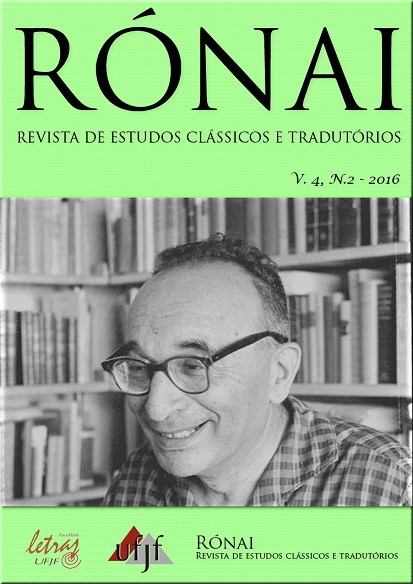O que querem (e o que podem) os jovens tradutores de Latim
Palabras clave:
ensino, tradução, pós-graduação, BrasilResumen
O ensino do Latim, que, no Brasil, existe quase exclusivamente no ensino universitário, tem como desafio introduzir os alunos em poucos anos de estudo a uma língua difícil e a uma literatura milenar que se mantiveram influentes ao longo dos séculos. Ao estudante, o caminho mais usual de aprendizagem reside na tradução de textos latinos em vernáculo e, quase sempre, é uma empreitada tradutória latino-portuguesa que lhe garante a continuidade de estudo nos níveis de Pós-Graduação. Essa prática didático-pedagógica tem resultado em inúmeros trabalhos de tradução de obras latinas, facilitando e favorecendo o acesso da comunidade leitora lusófona a uma renovada Antiguidade. Com o objetivo de fornecer um panorama das práticas desses jovens tradutores, abordarei neste artigo duas dissertações de mestrado de diferentes instituições brasileiras, procurando apontar abordagens tradutórias que florescem e vicejam nos trabalhos de nossos estudantes.
Descargas
Citas
BENJAMIN, W. A tarefa-renúncia do tradutor. Trad. de Susana Kampff Lages. In: HEIDERMANN, W. (Org.) Clássicos da teoria da tradução I. Florianópolis: EDUFSC, 2001. p. 187-215.
CATULO. O livro de Catulo. Trad., intr. e notas de J. A. Oliva Neto. São Paulo: Edusp, 1996.
CÍCERO. De optimo genere oratorum Intr., trad. e notas de AUTOR, 2011.
GLARE, P. G. W. Oxford Latin dictionary. Oxford: Clarendon Press, 1982.
HORACE. Satires, Epistles and Ars Poetica. Trad. H. R. Fairclough. London: Harvard University Press, 1999.
MATEDI, J.P. Elegias de Tibulo (Liber Primus): tradução, introdução e notas. 2008. 167 ff. Dissertação (Mestrado em Letras). Universidade Federal do Espírito Santo.
PICCOLO, A. P. O Homero de Horácio: intertexto épico no livro I das Epístolas. 2009. 458ff. Dissertação (Mestrado em Linguística). Universidade Estadual de Campinas- IEL.
Descargas
Publicado
Cómo citar
Número
Sección
Licencia
Derechos de autor 2017 Brunno V. G. Vieira

Esta obra está bajo una licencia internacional Creative Commons Atribución 4.0.
Derechos de autor
Los autores que publican en esta revista aceptan los siguientes términos:
1. Los autores y las autoras conservan los derechos de autor y le otorgan a la revista el derecho a la primera publicación, que está bajo la licencia Creative Commons Attribution License 4.0 Internacional.
2. Los autores y las autoras pueden publicar y compartir el trabajo con reconocimiento de la publicación inicial en esta revista.
3. Los autores y las autoras de las obras aprobadas autorizan a la revista a asignar el contenido de sus obras, después de la publicación, para su reproducción en indexadores de contenido, bibliotecas virtuales y similares.
Para obtener más información sobre Creative Commons Attribution License 4.0 Internacional, acceda a: https://creativecommons.org/licenses/by/4.0/deed.es
Exención editorial
El contenido de los artículos publicados es responsabilidad única y exclusiva de sus autores, y no representa la posición oficial de Rónai - Revista de Estudos Clássicos e Tradutórios o de la Faculdade de Letras de la Universidad Federal de Juiz de Fora o instituciones asociadas.



